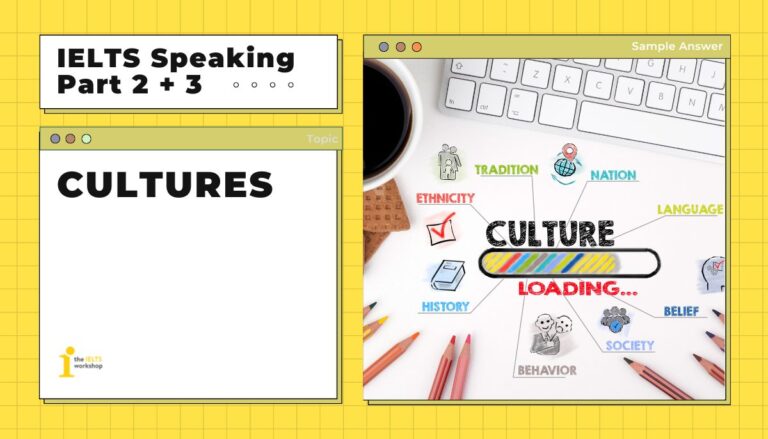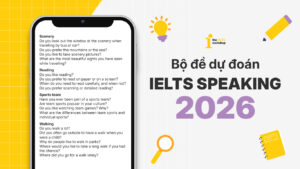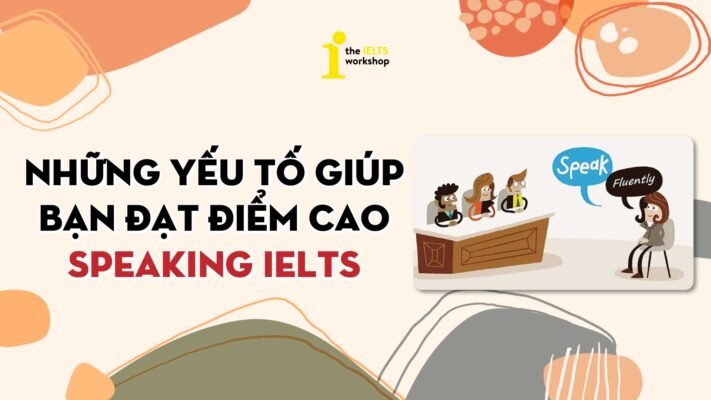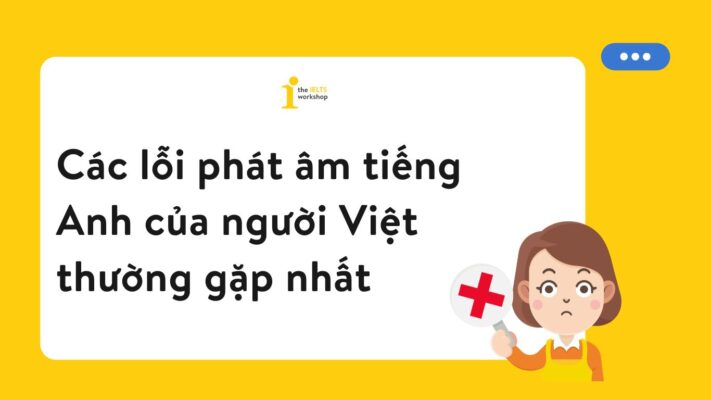Dưới đây là bài mẫu cho chủ đề Describe a person you know who is from a different culture trong IELTS Speaking Part 2 & 3 do thầy Trung Hiếu của The IELTS Workshop gợi ý. Cùng tham khảo một vài cách diễn đạt ghi điểm trong phần thi IELTS Speaking nhé.
Part 2: Describe a person you know who is from a different culture
Describe a person you know who is from a different culture
You should say:
Who he/she is
Where he/she is from
How you knew him/her
And explain how you feel about him/her
Dưới đây là bài mẫu cho topic “Describe a person you know who is from a different culture“.
1. Bài mẫu (Sample Answer)

2. Từ vựng (Vocabulary Highlight)
- light-hearted: nhẹ dạ cả tin
- very laid back: rất thoải mái
- cheeky: táo tợn
- dry humor: Hài không cảm xúc
- responsible: chịu trách nhiệm
- determined: xác định
- dining etiquette: nghi thức ăn uống
- marriage customs: phong tục hôn nhân
- rituals: nghi lễ
Part 3: Cultures
Bên cạnh Part 2, bạn hãy tham khảo thêm Part 3 cho chủ đề này nhé
1. Where and how can we get to know people of different cultures better?
2. What are the advantages and disadvantages of cultural diversity?
3. How can traditional culture and other cultures coexist?
4. Which Vietnamese traditions are disappearing?
1. Where and how can we get to know people of different cultures better?
I suppose social networking platforms such as Facebook, Reddit, and Instagram are the most convenient and quickest ways to connect with people from other cultures. These platforms provide people with a borderless and seamless kind of connection, so people can make acquaintances with each other and find like-minded companions easily. In terms of in-person interaction, I think tourist cities or regions in each country would be an apt place, in those cities there would normally be areas which are quite cosmopolitan, like West Lake or Old Quarter in Hanoi so if u want to get acquainted to foreigners you could just go there and strike a conversation with someone.
- cosmopolitan: khắp thế giới
2. What are the advantages and disadvantages of cultural diversity?
I think we can evaluate on an individual and collective or organizational level. Regarding each individual, being exposed to a culturally diverse setting would broaden one’s perspective and knowledge of the world, he or she would be more open-minded and understanding towards different viewpoints or mindsets.
On the other hand, personal identity could be adversely affected by diversity, since one might find it hard to adopt a way of life when there’s too many. In terms of community or society, diversity makes this world more interesting, more multifaceted, people have more things to discover and learn. However, differences in mindset could easily lead to disagreement, which could escalate into tension. Throughout the history of the world, there have been many conflicts stemming from cultural, racial or ethnic differences.
- culturally diverse setting: bối cảnh đa dạng về văn hóa
- mindsets: tư duy
- personal identity: danh tính cá nhân
- cultural: thuộc văn hóa
- racial: chủng tộc:
- ethnic: dân tộc
3. How can traditional culture and other cultures coexist?
For that to happen, I think the essential thing is open-mindedness and respect from advocates of both sides. As society progresses, new ways of thinking and doing are bound to emerge which would collide with the existing cultures. People supporting each type should acknowledge the merits of the opposing viewpoint and the flaws in their own. They should be open to find common grounds to build shared values and find a way for all cultures to harmonize. If it’s too far-reaching then at least people shouldn’t try to berate one another and just try to respect and accept that there are perspectives alien to their own.
- harmonize: hài hòa
- perspectives alien: quan điểm xa lạ
4. Which Vietnamese traditions are disappearing?
I’m not really a traditional savant so it’s hard for me to answer this question, off the top of my head I think there are two practices that are slowly becoming ancient. The first one would be dyeing black teeth. In the past, people’s concept of beauty was having black teeth but now obviously things have changed, perspectives have changed and having white teeth is considered the standard of beauty so you can only spot this tradition within traditional tribes or women from past generations.
The second one could be chewing betel. This ‘fruit’ or ‘nut’ was ubiquitous in the past, everyone regarded it as a snack and a means to strike a conversation, like a cup of coffee nowadays. Betel chewing was also a way to maintain the black color of the teeth after dyeing so it is understandable that both of these customs are slowly vanishing in Vietnamese cultural practices.
- practices: thực hành
- tradition: truyền thống
- customs: phong tục
- practices: thực hành
Bài mẫu bởi thầy Trung Hiếu – Giáo viên The IELTS Workshop HN
Trên đây là bài mẫu cho chủ đề Culture trong IELTS Speaking Part 2 và Part 3. Bạn có thể tham khảo bộ từ vựng tiếng Anh về chủ đề Văn hóa.
Nếu bạn đang gặp khó khăn trong xây dựng câu trả lời cho phần thi IELTS Speaking Part 3, hãy tham khảo ngay phương pháp học tại khóa Senior của The IELTS Workshop.









